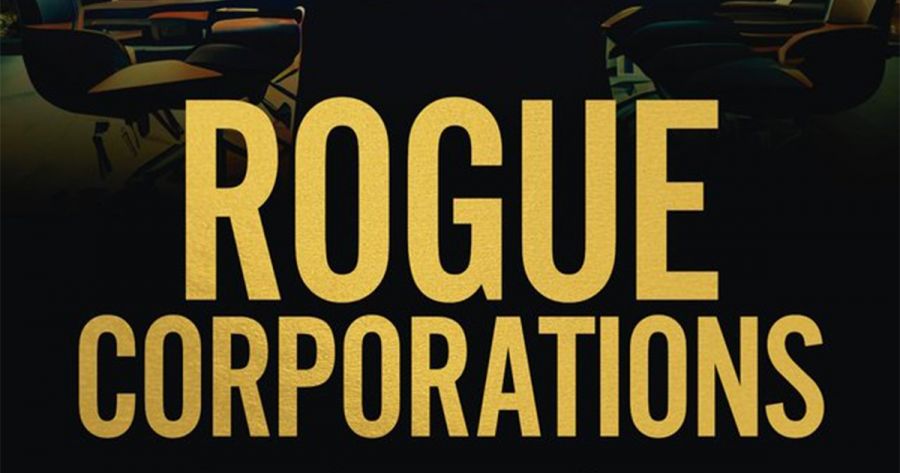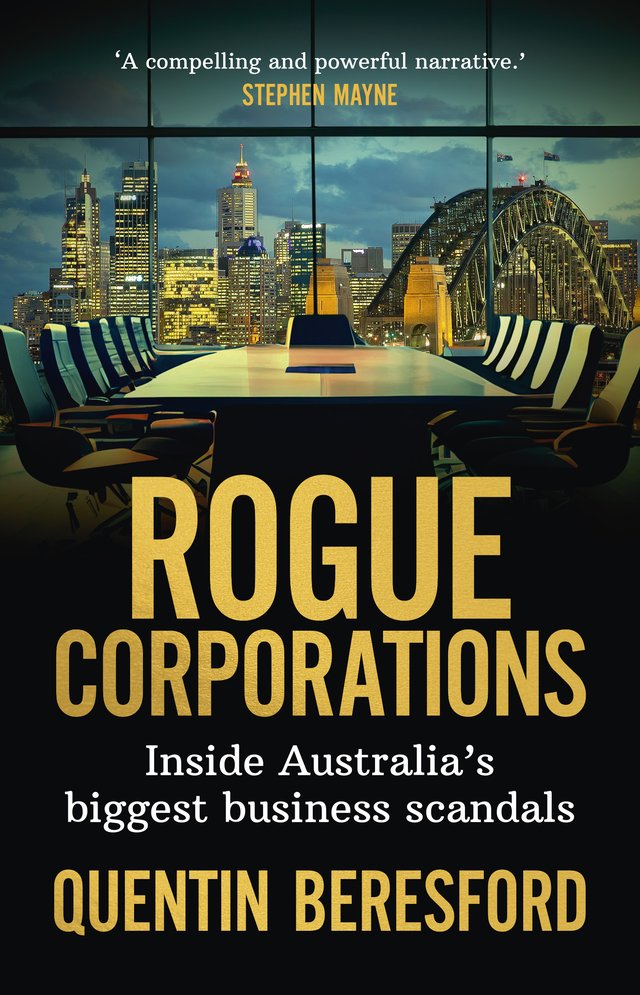
- Free Article: No
- Contents Category: Business
- Review Article: Yes
- Article Title: Thirteen scandals
- Article Subtitle: A litany of corporate wrongdoing
- Online Only: No
- Custom Highlight Text:
Quentin Beresford, an adjunct professor in politics at Sunshine Coast University, has written and edited about a dozen books, including the excellent Wounded Country (2021), which dealt with the failure of water policy in the Murray-Darling Basin. His latest offering explores thirteen ‘business scandals’ in Australia. Beresford’s definition of a scandal is selective and eclectic. The scope of the book extends to corporate collapses but also to wage theft, climate-change denial, occupational health and safety failures, and the destruction of Indigenous heritage sites.
- Featured Image (400px * 250px):

- Alt Tag (Featured Image): Stuart Kells reviews ‘Rogue Corporations: Inside Australia’s biggest business scandals’ by Quentin Beresford
- Book 1 Title: Rogue Corporations
- Book 1 Subtitle: Inside Australia’s biggest business scandals
- Book 1 Biblio: NewSouth, $34.99 pb, 426 pp
- Book 1 Cover Small (400 x 600):

- Book 1 Cover (800 x 1200):

‘This is the first book,’ Beresford writes, ‘to explore corporate scandals as a continuous phenomenon of Australian society over the past four decades.’ Perhaps, but the book sits firmly in the tradition of such works as Adele Ferguson’s Banking Bad (2019), Dan Ziffer’s A Wunch of Bankers (2019), Alan Kohler’s It’s Your Money (2019), and, going back, Michael Cannon’s Land Boomers (1966) and Trevor Sykes’s TwoCenturies of Panic (1988).
Beresford’s background is in public policy and juvenile justice, rather than finance, and he makes some financial missteps, such as spelling the name of well-known stockbroker J.B. Were twice as ‘J.B. Wear’ and conflating the ‘efficient markets hypothesis’ (which is about securities pricing) with the wider concept of laissez-faire economics. In surveying the respective scandals, Beresford uses to good effect the work of journalists such as Ferguson, Kohler, Janet Fife-Yeomans, Elizabeth Sexton, and Ian Verrender.
Beresford writes lucidly and has an eye for curious details that add spark to familiar stories. I didn’t know, for example, that before Alan Bond was a white-collar criminal he was a no-collar one, caught wearing a pair of State Electricity Commission overalls and trying to break into several properties. ‘Young hustler’ Brad Cooper, Beresford writes, ‘loved his exotic toys. He is said to have hired a security guard to watch over his Ferrari when it was parked in the street.’ Emmanuel Cassimati ‘looked more like an aging wrestler with his stocky frame, large, bald-domed head and jowly cheeks, than a financial guru’.
HIH boss Ray Williams was ‘a Christadelphian, a member of a small, cult-like sect whose believers wished to reconnect with the literal word of the Bible and the culture of Christianity as it arose in the first century ad’. Williams was so devoted to the sect that he even ‘built a chapel in the grounds of his mansion at Lake Macquarie, north of Sydney’.
On the way to wealth and infamy, ‘Chris Skase’ transformed himself into Christopher Skase. The former Skase’s Christmas parties were modest; the new Skase’s were anything but. At his first Skase party Alan Kohler was horrified: ‘He and the other guests were pressured to go up on stage and say nice things about Christopher.’ Skase’s 1987 party was held at the Gold Coast Mirage resort. ‘The ballroom air-conditioning was turned down to chill level … allowing Skase to stride triumphantly on to centre stage to the sound of Bob Dylan’s “Quinn the Eskimo”.’
Skase reportedly spent half a million dollars on his fortieth-birthday bash. That same month, he opened the Port Douglas resort, where ‘an odd collection of pale, drunken stockbrokers, bankers and journalists tried in vain to blend in with the suntanned celebrities’. At a Skase golf event, ‘many of the guests ended up in the lagoons, designer wear cast aside, while one company director was seen on a hotel balcony suite in a very compromising position behind a younger woman who was gripping the balustrade tightly’.
Beresford is at his strongest when looking at legal cases and loopholes, such as the one that allowed Skase to declare bankruptcy and flee the country to a villa on Majorca. In preparation for his escape, Skase filled two shipping containers with ‘a pair of Rolls-Royces, a BMW, fifteen Bang & Olufsen stereos, tele-visions, and enough beds, marble furniture and antiques to spread through the nine-bedroom estate’.
Several common factors link Beresford’s thirteen scandals, including acquiescent regulators, incompetent accountants, and high-living, psychopathic CEOs. The big banks also repeatedly enter the picture: ‘Bond Corporation’s 1980s spending spree was underwritten by some of the largest banks in Australia and the world. Just how these banks ended up lending Bond $14 billion is like entering an Alice in Wonderland fantasy world.’
Regulatory lassitude was another common factor. The Australian Securities and Investments Commission (ASIC), our principal corporate overseer, ‘had always been a lame-duck’. Victims of Storm Financial mounted a class action against ASIC, ‘the first legal case of its kind … testing the boundaries of how far a regulator could be held accountable for its actions’.
Meanwhile, banking watchdog APRA ‘was described as a “hear no evil, see no evil” regulator, with an “embarrassing” record’. Beresford identifies free-market ideology and ‘the very essence of the neo-liberal worldview’ as an overarching cause of the recurring scandals.
Australia has embraced the neo-liberal idea of allowing corporations maximum freedom with minimal responsibilities to wider society. Australia incorporated the so-called ‘Friedman doctrine’, the view associated with Nobel Prize-winning economist Milton Friedman, who, in the 1960s, argued that the only purpose of a corporation was to maximise shareholder wealth.
Powerful corporations captured the decision-making processes of the state. In sectors such as aged care and insurance, corporates were permitted to write their own legislation, thus cementing their own interests.
Opportunities to temper market excesses were ignored on ideological grounds. ‘In 2002, John Howard backed away from demands for enhanced corporate legislation. Self-regulation coupled with appropriate “but not excessive” levels of government involvement was what Australia needed, Howard explained.’ Addressing fundamental weaknesses in corporate law was not on his agenda.
Beresford charts the decline of once-respected companies such as Westpac, which, in 2020, was hit with a $1.3 billion fine, the largest in Australian corporate history. Among a wide range of shocking failings, the bank was found to have facilitated transfers to a person in the Philippines ‘who was later arrested in November 2015 for child trafficking and child exploitation involving the live streaming of child sex shows and offering children for sex’. According to Amanda Wood, Westpac’s former anti-money laundering officer, ‘a very different culture did exist inside the company from that of its carefully crafted corporate image’.
The superannuation industry was another hot zone of bad actors.
[Compulsory superannuation] spurred a financial services industry imbued with a ruthless culture: one that charged high fees for advice and exploited clients by taking commissions to direct them into designated financial products. In other words, financial advisers didn’t always act in the best interests of their clients. Large sections of the industry had become ‘the sales force for financial product manufacturers’.
Beresford rightly points out that the lives of hundreds of thousands of Australians were upended due to the misconduct he describes. The upshot is clear: as a society, we urgently need to reset our collective tolerance for corporate wrongdoing. That will require a concerted effort across politics, the law and the media, extending to stronger corporations law and more assertive corporate regulators, as well as to improved political donation rules and more robust whistleblower protections.
To prepare for that effort, everyone should read Rogue Corporations, and all students of business and the law should study it.

Comments powered by CComment